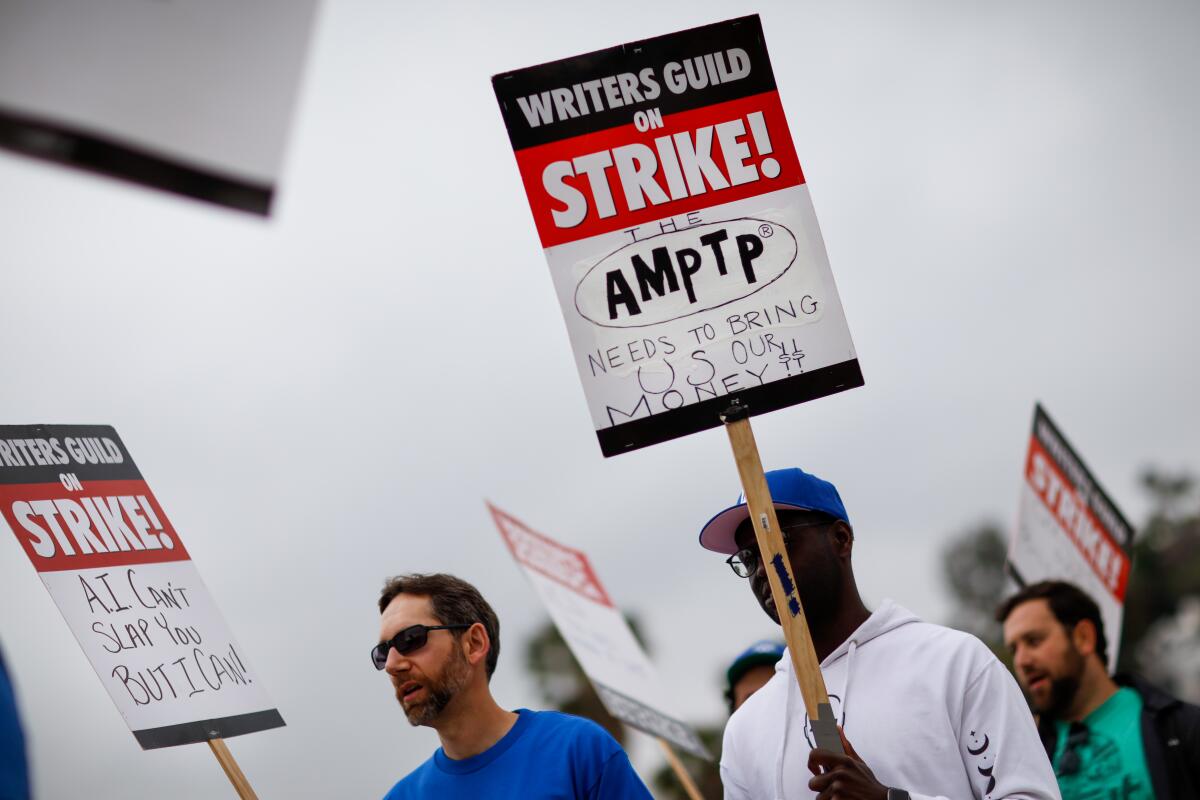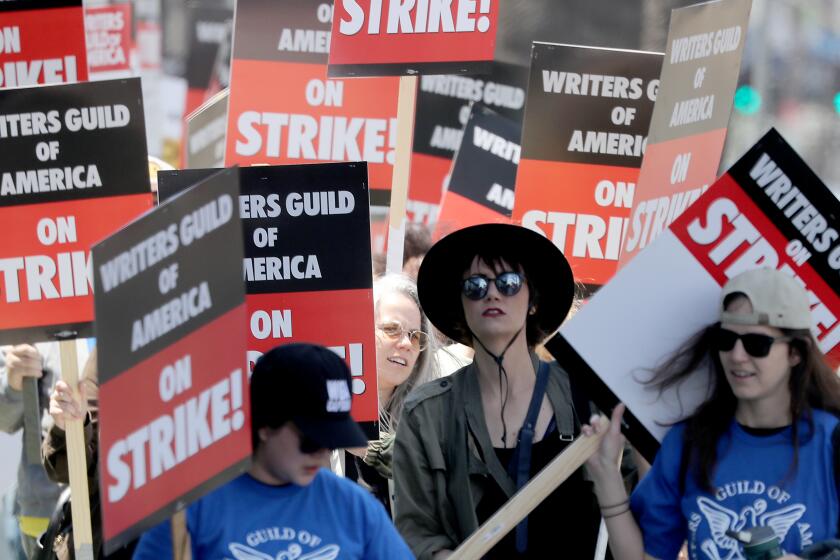WGA and studios hold marathon talks but no deal yet to end strike

- Share via
The Writers Guild of America and major studios held a marathon bargaining session Thursday, with a meeting that stretched into the evening in a sign of progress toward a deal that would end the strike that has dragged on for more than 140 days.
In a note to guild members Thursday night, members of the WGA negotiating committee said talks with the studios would resume Friday.
“Your Negotiating Committee appreciates all the messages of solidarity and support we have received the last few days, and ask as many of you as possible to come out to the picket lines tomorrow,” the committee said.
The Alliance of Motion Picture and Television Producers, which handles labor negotiations for the studios, did not comment.
It was the second time the writers’ representatives met with studio heads this week. After weeks of little headway amid the crippling strike, the two sides met Wednesday for the first time since an Aug. 22 meeting that representatives for the writers described as a “lecture” and a browbeating session.
The last two meetings included top executives from some of the major media companies represented by the AMPTP.
NBCUniversal Studio Group Chairman Donna Langley, Walt Disney Co. Chief Executive Bob Iger, Netflix co-CEO Ted Sarandos and Warner Bros. Discovery chief David Zaslav have gotten directly involved in the meetings, a signal of the increasing pressure on the industry to get a deal done that would return thousands of entertainment industry employees to work. Thursday’s session began at around 9:30 a.m. and ended at about 7:30 p.m.
Both sides continued meeting because they didn’t want to lose momentum, according to a person familiar with the matter who declined to be named.
The 2023 writers’ strike is over after the Writers Guild of America and the Alliance of Motion Picture and Television Producers reached a deal.
People close to the negotiations described the tone of Wednesday’s bargaining as positive, but that reports of the two sides being close to a deal were off base. The WGA was expected to respond Thursday to proposals that the studio group had put forth.
Sources said the studio chiefs and the WGA negotiators are motivated to do a deal. If the strike drags on much longer, studios’ TV and film schedules will be further disrupted, resulting in additional financial pain for the companies. Workers, including below-the-line crew, are suffering from months of going without a paycheck.
Many of the studios are eager to get an agreement hammered out by early October to salvage their 2024 film slates, which would require them to be back in production soon. They’re also hoping to salvage what they can from the 2023-24 television season. In the absence of new scripted original shows, the TV networks have filled out their fall schedules with reality series, sports and reruns.
WGA members have been on strike since May 2, with their work stoppage approaching a record length for the guild. Film and television actors represented by SAG-AFTRA walked out in mid-July, resulting in a dual strike that essentially halted scripted production and hobbled studios’ ability to promote theatrical films. Studios have already delayed some of their 2023 movies because actors aren’t able to do publicity.
The WGA and the studios had returned to bargaining before in August, but the Aug. 22 session between guild negotiators and top executives cast a pall over the industry. After that meeting went badly, the AMPTP publicly released a summary of its Aug. 11 proposal, which angered writers who saw the movie as a tactic to go around the guild’s negotiating committee.
In subsequent weeks, each side insisted it was the other’s turn to offer a counterproposal. In one memo, the guild suggested that individual studios might be willing to splinter off and do their own deals with the writers. The AMPTP, in a statement, called this notion “false.”
Last week, the studio alliance said the WGA had reached out to restart negotiations, signaling a possible thaw was underway. WGA’s negotiating committee co-chair Chris Keyser spoke individually with some studio executives to convey the guild’s readiness to negotiate, according to two people familiar with the situation who were not authorized to comment. The CEOs met among themselves Tuesday to set the parameters for what a deal could look like from their perspective, one source said.
As talks restarted this week, large gaps remained between the two sides. Writers are seeking minimum staffing requirements in writers rooms, protections against artificial intelligence and more transparency from streamers on viewership so they can receive more financial rewards when programs are successful.
The impulse to write is strong, as thousands of TV and film writers in the WGA are discovering while on strike. Might as well tell a hen to not lay eggs.
Many writers have expressed concerns that the fewer number of episodes on seasons on streaming series has made it more difficult to earn a living in Southern California and have been seeking pay increases and more stability.
The WGA, in its original proposal, had sought a minimum of six writers per writers room. The AMPTP, in an Aug. 11 proposal, offered to let showrunners on high-budget streaming and TV series hire at least two writers for at least 20 weeks of employment. It further proposed guaranteeing writers a minimum of 10 weeks of employment in development rooms.
In a summary of its Aug. 11 proposal, the AMPTP said it offered the largest pay bump for the WGA in 35 years, with wages increasing 5% in Year One of the proposed contract, followed by gains of 4% and 3.5% in subsequent years. The WGA had sought a 6% increase to minimums and residual bases in the first year, followed by 5% increases in the second and third years.
Viewership data from streaming services such as Netflix and Disney+ has become a major sticking point in the writers’ and actors’ strikes.
The two sides also remain apart on the issue of viewership data and a payment system based on the success of streaming shows. The AMPTP offered that the WGA could study confidential quarterly reports that show total minutes viewed of high-budget films and series and the programs’ total running time.
But the WGA’s negotiating committee said that such data would be accessible only to six guild staff members under the AMPTP’s proposal. “No writer can be told by the WGA about how well their project is doing, much less receive a residual based on that data,” the WGA’s negotiating committee wrote in an Aug. 24 note to the union’s members.
“The counteroffer is neither nothing, nor nearly enough,” the negotiating committee said in its memo at the time.
More to Read
Inside the business of entertainment
The Wide Shot brings you news, analysis and insights on everything from streaming wars to production — and what it all means for the future.
You may occasionally receive promotional content from the Los Angeles Times.















